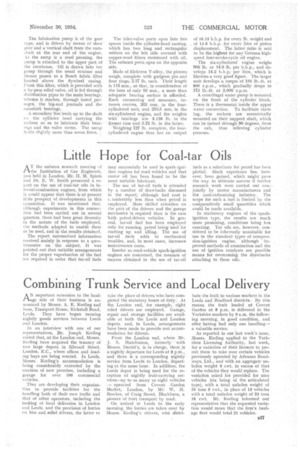Little Hope for Coal-tar Oils
Page 45

If you've noticed an error in this article please click here to report it so we can fix it.
AT the autumn research meeting of the Institution of Gas Engineers, just held in London, Mr. H. M. Spiers and Dr. E. W. Smith presented a report. on the use of coal-tar oils in internal-combustion engines, from which it would appear that there is at present little prospect Of developments in this connection. It was mentioned that, although experiments in this connection bad been carried out in several quarters, there had been great diversity in the nature of the fuels employed, the methods adopted to enable them to be used, and in the results obtained.
The report summarized information received mainly in reSponse to a questionnaire on the subject. It was pointed out that suitable arrangements for the proper vaporization of the fuel are required in order that tar-oil fuels may successfully he used in spark-ignition engines for road vehicles and that castor oil has been found to be the most suitable lubricant,
The use of tar-oil fuels is attended by a number Of drawbacks discussed in the report; although fuel cost is c.nsiderably less than when petrol is employed. More skilled attention on the part of the drivers and the! garage mechanics is required than is the case ivith petrol-driven vehicles. In general, tar-oil fuel has been employed only for running, petrol being used for starting up and idling. The use of tar-oil fuels adds to mechanical troubles, and, in most cases, increases maintenance costs.
Insofar as road-vehicle spark-ignition engines are concerned, the measure of success obtained in the use of tar-oil fuels as a substitute for petrol has been partial. Much experience has, however, been gained, which might pave the way to ultimate success if further research work were carried out con-. jointly by motor manufacturers and the, coal-carbonizing industry. The scope for such a fuel is limited by the comparatively small quantities which could be made available.
In stationary engines of the sparkignition type, the results are much more promising, conditions being less exacting. Tar oils are, however, considered to be inherently unsuitable for use in the standard types of compression-ignition engine, although improved methods of atomization and the use of ignition catalysts are possible means for overcoming the drawbacks attaching to these oils.




































































































